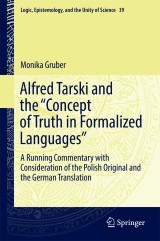Details

Alfred Tarski and the "Concept of Truth in Formalized Languages"
A Running Commentary with Consideration of the Polish Original and the German TranslationLogic, Epistemology, and the Unity of Science, Band 39
|
96,29 € |
|
| Verlag: | Springer |
| Format: | |
| Veröffentl.: | 02.09.2016 |
| ISBN/EAN: | 9783319326160 |
| Sprache: | englisch |
Dieses eBook enthält ein Wasserzeichen.
Beschreibungen
<p>This book provides a detailed commentary on the classic monograph by Alfred Tarski, and offers a reinterpretation and retranslation of the work using the original Polish text and the English and German translations. In the original work, Tarski presents a method for constructing definitions of truth for classical, quantificational formal languages. Furthermore, using the defined notion of truth, he demonstrates that it is possible to provide intuitively adequate definitions of the semantic notions of definability and denotation and that the notion in a structure can be defined in a way that is analogous to that used to define truth. Tarski’s piece is considered to be one of the major contributions to logic, semantics, and epistemology in the 20th century. However, the author points out that some mistakes were introduced into the text when it was translated into German in 1935. As the 1956 English version of the work was translated from the German text, those discrepancies werecarried over in addition to new mistakes. The author has painstakingly compared the three texts, sentence-by-sentence, highlighting the inaccurate translations, offering explanations as to how they came about, and commenting on how they have influenced the content and suggesting a correct interpretation of certain passages. Furthermore, the author thoroughly examines Tarski’s article, offering interpretations and comments on the work.</p>
Part 1. Introduction.- Chapter 1. Remarks on the objective of the dissertation.- Chapter 2. Remarks on the construction and the content of the dissertation.- Chapter 3. The text versions used in the present dissertation.- Chapter 4. General terminological questions and translational issues.- Chapter 5. Intuition.- Chapter 6. Materially adequate and formally correct definition.- Chapter 7. Sentence vs. Statement.- Chapter 8. Quantification.- Chapter 9. Consistency.- Chapter 10. Articles.- Chapter 11. Metatheory vs. metascience.- Part 2. Commentary.- Chapter 12. Introduction.- Chapter 13. The Concept of True Sentence in Everyday or Colloquial Language.- Chapter 14. Formalized Languages, especially the Language of the Calculus of Classes.- Chapter 15. The Concept of True Sentence in the Language of the Calculus of Classes.- Chapter 16. The Concept of True Sentence in Languages of Finite Order.- Chapter 17. The Concept of True Sentence in Languages of Infinite Order.- Chapter 18. Summary.- Chapter 19. Postscript.- Conclusion.
This book provides a detailed commentary on the classic monograph by Alfred Tarski, and offers a reinterpretation and retranslation of the work using the original Polish text and the English and German translations. In the original work, Tarski presents a method for constructing definitions of truth for classical, quantificational formal languages. Furthermore, using the defined notion of truth, he demonstrates that it is possible to provide intuitively adequate definitions of the semantic notions of definability and denotation and that the notion in a structure can be defined in a way that is analogous to that used to define truth. Tarski’s piece is considered to be one of the major contributions to logic, semantics, and epistemology in the 20th century. However, the author points out that some mistakes were introduced into the text when it was translated into German in 1935. As the 1956 English version of the work was translated from the German text, those discrepancies were carried over in addition to new mistakes. The author has painstakingly compared the three texts, sentence-by-sentence, highlighting the inaccurate translations, offering explanations as to how they came about, and commenting on how they have influenced the content and suggesting a correct interpretation of certain passages. Furthermore, the author thoroughly examines Tarski’s article, offering interpretations and comments on the work.
Offers a new interpretation on the classic work by Tarski, that examines the original piece well as its subsequent translations Includes commentary on how mistranslations or omissions have influenced the interpretation of Tarski’s work Presents the three versions of the classic article in parallel Includes supplementary material: sn.pub/extras

















